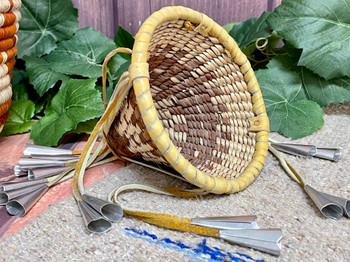Description
The burden basket of the Native American Apache tribe is one of the most recognized baskets of American Indians. Traditionally, burden baskets were originally used in everyday life for gathering wild foods and harvesting crops like corn. Large burden baskets were also used for food storage and have been used for generations. Burden baskets are also an integral part of Apache history being used in their rituals and ceremonies. This basket is 8.25" in diameter by 5.75" tall. The burden baskets are created in various sizes. They are very labor intensive to weave so today they are usually made in small sizes of about 2 to 4 inches in diameter to be hung by a door or used for home decorating. It is only for very special occasions that baskets of 12" or larger are made. Larger baskets are exceptionally rare and large baskets that were actually used in a ceremony are all but unattainable. This Apache basket is a cultural treasure.
Apache burden baskets like this one are used by Apache girls during their coming of age ceremony at the age of 12. Also called the Apache puberty ceremony, it is a rite of passage to womanhood that young Apache girls celebrate. Each young lady involved in the ceremony spends many days in preparation. A traditional garment is made. Each girl also has a burden basket made and food is prepared for the community. Using willow sticks and bark strips the basket was carefully hand woven. Using either the bark or smooth side, the strips are woven between the willow sticks to create the beautiful patterns you see. The pattern is in reverse on the inside and outside of the basket. Four days before the ceremony the family builds a hogan, then at the beginning of the ceremony, the young lady enters the hogan. The ceremony lasts four days with feasting and dancing by the famous Apache, Crown Dancers.
After the ceremony the young lady remains for an additional four days being instructed in the things of womanhood. During the ceremony, there are many blessings given and the young girls are painted with a mixture of corn meal and clay. Early in the morning the young ladies run toward the morning sun as young Apache women have done for centuries, symbolizing the legend of "White Painted Woman" and celebrating the transition from the old to the new generation, continuing the tradition. During the mid 1900's the puberty ceremony was declared illegal and only allowed to begin again in 1978. Prior to that time, the ceremonies were held in secret.
This beautiful basket has a leather buckskin strap as well as strips of leather buckskin with metal cone gingles representing the four directions of earth revered in Native American culture. There are also the buckskin strips and gingles hanging from the bottom of the basket. According to Apache tradition, burden baskets are always cone shaped, with a flat or rounded bottom. Buckskin and tin jingles were added to enhance the basket. Adult size burden baskets almost always have a buckskin strap that is used to to carry the basket. As the baskets were carried through the day while working the tin cones would jingle to scare away snakes that may be nearby. Small burden baskets were given to the Apache children by their parents.
As their mother worked in the field, she could hear the jingles and know where her children were. The traditional custom of the Apache, is to hang these baskets outside the home and visitors to the house are to place their burdens in the basket before they enter the home. The saying "leave your burdens at the door" originated with these baskets. The burden basket is a symbol of pride for the Apache people. This is a very rare piece of Native American history because it is a craft of an older generation that not very many young people are continuing, and we are very pleased to be able to offer it. Actual basket is shown. Measures 8.25" diameter, 5.75" tall.
Authentic Native American, Tribe Jana Zospah: Apache










